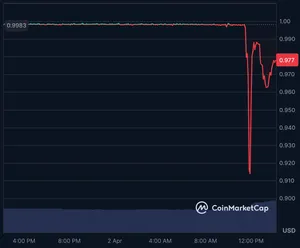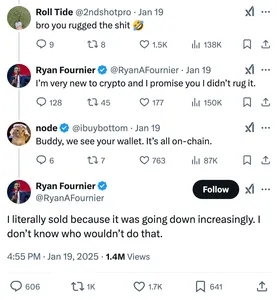The ZK token quickly dropped around 20% in price, likely as a result of the thief trying to sell the tokens.
$5 million in tokens stolen from ZKsync
KiloEx exploited for $7.5 million
KiloEx halted trading on the platform while investigating the exploit, and contacted the hacker to try to negotiate a 90% return of funds.
Mantra token price suddenly collapses by 90%
Some have accused Mantra of rug-pulling or accused Mantra investors like Laser Digital of mass sell-offs. However, Mantra claims that the flash crash was due to "reckless forced closures initiated by centralized exchanges on OM account holders" — a claim that has been questioned by those observing the rapidity of the crash.
FDUSD depegs
The rumor has been amplified by Tron founder Justin Sun, who tweeted: "First Digital Trust (FDT) is effectively insolvent and unable to fulfill client fund redemptions. I strongly recommend that users take immediate action to secure their assets." First Digital responded by insisting they were solvent, and denounced Sun's comments as "a typical Justin Sun smear campaign to try to attack a competitor to his business".
zkLend thief gets robbed
On March 31, the attacker sent an on-chain message to the platform, writing: "Hello I tried to move funds to tornado but I used a phishing website and all the funds have been lost. I am devastated. I am terribly sorry for all the havoc and losses caused. All the 2930 eth have been taken by that site owners. I do not have coins. Please redirect your efforts towards those site owners to see if you can recover some of the money. I am sorry."
The zkLend project instructed the thief to return any remaining funds to their wallets, though no such transfer has happened yet.
There has been substantial conversation over whether the hacker had truly been in turn scammed out of the stolen funds, had made up a fake phishing site to try to obscure the path of stolen money, or perhaps whether the whole event had been an April Fools' joke. However, zkLend noted on Twitter that the phishing website, which imitates the Tornado Cash platform, has been operational for five years and is likely not connected to the hacker.
- On-chain messages between zkLend and thief
- Tweet by zkLend [archive]
ICERAID crypto project claims to pay people to report immigrants and "terrorist" judges to law enforcement
An instructional video posted to social media by the platform encourages people to "do [their] patriotic duty" by going to a District Court in a blue state, then "Secretly snap a photo of the judge. Don't let the bailiff see you." The video shows a person uploading a photograph of Judge James Boasberg, who is presiding over the Trump administration deportation flights case, and reporting him for "terrorism".
The project has been likened to Stasi programs in which citizens were paid to spy and report on their neighbors.
The founder of ICERAID, Jason Meyers, claims that he had had conversations with the White House about the project, although the website for the tool states it is not affiliated with any government agency and is not a website of the US government. Meyers has faced several enforcement actions resulting in disciplinary penalties over his involvement in security sales, and in 2014 was permanently banned by FINRA from broker-dealer activities after misappropriating investor funds. Meanwhile, multiple users have complained about not receiving their promised ICERAID tokens, and the project reportedly changed its terms after the token presale to reduce the amount of money buyers would earn for participating.
Coinbase customer loses $35 million in bitcoin theft
zachxbt has previously accused Coinbase of not doing enough to protect customers from hundreds of millions of dollars in scams, and he noted that in these cases, Coinbase had not marked the thief wallets as malicious in various cryptocurrency compliance tools.
- Telegram post by zachxbt [archive]
Galaxy Digital agrees to $200 million settlement over alleged LUNA manipulation
In addition to promoting the token through the usual means, Novogratz got a large tattoo on his shoulder representing the token. Sadly for him, although the LUNA token would later fade away after crashing in spectacular (and fraudulent) fashion, tattoos are forever.
- "Galaxy Digital Settles with NYAG for $200 Million Over Luna Ties", Wall Street Journal [archive]
HyperLiquid loses $13.5 million in alleged JELLYJELLY manipulation incident
HyperLiquid validators voted to delist the JELLY token. They also evidently overrode the JELLY price provided by the market oracle in an attempt to reduce their losses, leading an unrelated crypto executive to question "Is that even legal?"
Polymarket suffers governance attack as whale manipulates Ukraine bet resolution; refuses refunds
Recently, $7 million was spent in a Polymarket market over whether Ukraine would agree to Trump's proposed mineral deal. Though no mutual agreement was reached, the market resolved to "yes". When it was challenged, a large holder of the UMA token cast a substantial number of yes votes to sway the outcome of the resolution, leaving the outcome in place.
Although Polymarket acknowledged that "This market resolved against the expectations of our users and our clarification" (referring to a Polymarket clarification that the resolution was too early as no mutual agreement was reached), they also refused to issue any refunds, writing that "this wasn't a market failure". "This is an unprecedented situation, and we have been in war rooms all day internally and with the UMA team to make sure this won't happen again. This is not a part of the future we want to build," the team member added.
Abracadabra loses $13 million in "Magic Internet Money"
This is the second time Abracadabra has been exploited, after suffering a $6.5 million theft in January 2024.
Binance acknowledges employee insider trading
Binance announced that they had fired the employee, as "This behavior constitutes front-running based on non-public information obtained from his previous role and is a clear breach of company policy." The company became aware of the insider trading after they were alerted by outside parties who submitted tips to the company.
Zoth hacked for nearly $8.3 million, second theft in two weeks
This is the second Zoth exploit in two weeks, following a $285,000 theft on March 6 by an attacker who took advantage of a bug in one of the platform's smart contracts.
Four.Meme suffers second hack in as many months
Four.Meme acknowledged the latest theft on Twitter, writing that they intended to reimburse users who lost money.
Zoth RWA restaking platform hacked
- "Zoth Hack Analysis", SolidityScan
1inch loses $5 million to smart contract bug
Wemix Foundation bridge hacked for $6.2 million
Founder of the Mask Network loses more than $4 million to a wallet hack
Almost $50 million stolen from Infini "stablecoin neobank"
Infini experienced a different form of "financial freedom" when attackers liberated almost $50 million from the company after a thief with access to a wallet with admin rights drained tokens, then swapped them for the DAI stablecoin, which unlike USDC cannot be frozen by its issuer.
The attack came only a day after a celebratory tweet from the company in which it had announced that they had achieved $50 million in total value locked, suggesting that the theft affected substantially all of the assets on the platform. Despite this, they have claimed that transactions on the platform are unaffected, and when someone asked how that was possible, they simply replied: "We've got solid runway to operate. No worries."
Infini attempted to contact the thief via on-chain message, threatening that they had "gathered critical IP and device information" about them, and asking them to return 80% of the funds in exchange for a promise that Infini "will cease further tracking or analysis, and you will not face accountability". However, Infini's 48-hour deadline has come and gone without any reply.
- "0xInfini Incident Analysis", CertiK
- Tweet by Infini [archive]
- Messages from Infini to the exploiter
$1.5 billion taken from Bybit crypto exchange
Bybit CEO Ben Zhou confirmed the attack on Twitter, writing that an attacker used an advanced phishing technique to take control of the hot wallet. Zhou also promised "Bybit is Solvent even if this hack loss is not recovered, all of clients assets are 1 to 1 backed, we can cover the loss."
Around 9,000 wallets used with Cardex fantasy trading card game compromised
Attackers compromised a private key belonging to the game's creators, which allowed them to drain wallets that still had an active session with the game.
Argentinian president Javier Milei promotes memecoin that then crashes 95% in apparent $100 million+ rug pull
However, within hours of the launch, insiders began selling off their holdings of the token. The token had been highly concentrated among insiders, with around 82% of the token held in a small cluster of apparently insider addresses. Those insiders cashed out around $107 million, crashing the token price by around 95%.
After the crash, Milei deleted his tweet promoting the project. He later claimed he was "not aware of the details of the project and after having become aware of it I decided not to continue spreading the word (that is why I deleted the tweet)."
zkLend hacked for around $9.5 million
Trader accidentally sends 2,000 SOL to bankrupt FTX
All in all, this customer is actually pretty lucky as far as erroneous transfers go. FTX's bankruptcy team still has access to FTX wallets, and are still actively working on recovering and disbursing assets to creditors. In some cases in the crypto world, erroneous transfers are lost forever.
BNB-based pump.fun competitor Four.Meme loses $183,000 to attack
Coinbase accused by crypto sleuth zachxbt of allowing more than $300 million per year in social engineering attacks on its customers
zachxbt recounted how scammers routinely spoof phone numbers and use stolen personal information to gain trust with victims on phone calls, where they claim to be Coinbase employees informing users of unauthorized account access. They then walk victims through "securing" their accounts, but in reality they direct people to cloned versions of the Coinbase website where the victims are made to transfer their assets to the scammers.
zachxbt concluded, "Coinbase needs to urgently make changes as more and more users are being scammed for tens of millions every month. ... Coinbase is in a position where they have the power to make these changes and set a good example but they have chosen to do little to nothing ."
AlleyCat project developer takes presale money to fund gambling habit
Altogether, around $827,000 has passed through the AlleyCat creator's Sportsbet.io account in seven months. Crypto scam-spotting account Rug Pull Finder has alleged that the AlleyCat creator is also behind other rugpulls.
The AlleyCat cryptocurrency project is based on the 1983 Atari game of the same name, though the crypto project does not appear to have any affiliation with (or approval from) the game's creators.
- "AlleyCat - The Gambling Deployer!", Rug Pull Finder
Dogwifhat memecoin lies about deal to put the meme on the Las Vegas Sphere after raising $700,000 to pay for it
However, crypto media firm Decrypt reached out to a spokesperson for the Las Vegas Sphere and discovered that no such deal had been reached.
Dogwifhat creators have since backtracked, replacing the tweet with a version omitting the "officially confirmed" portion, but still claiming that they "have been in ongoing negotiations with various parties to collaborate on the Sphere ad placement". They promised to return the funds "if, by any chance, the plan is not executed".
DogWifTools rugpuller tool rug pulls the rugpullers
However, poor security by the software developers allowed attackers to ship a remote access trojan (RAT) along with the DogWifTools release. Once the package was downloaded, the trojan began scanning infected devices for crypto private keys, login information, and other sensitive data. Attackers even used scans of identification documents taken from their targets' computers to create Binance accounts.
Ultimately, around $10 million was stolen from would-be scammers. Along with the virus, the people who compromised DogWifTools left an angry note on infected machines: "Solana is a fucking joke and a scam from the beginning, it was designed for criminals by criminals! As a result, we have confiscated all your crypto, because you deserved it! You people who use automated tools to run these scam tokens are fucking disgusting to us. It's about time you got fucked over for once. Solana is nothing more than a shitty platform that enables scammers and rug pullers to steal from innocent users."
They also launched an onion website containing a message: "We specifically targeted scammers in the crypto market who were using tools to gain an unfair advantage over innocent, day-to-day traders. ... We believe it was morally correct to confiscate money that was not rightfully theirs." They added that they would soon be publishing the user data they stole on the scammers.
- "Poetic Justice", Rekt [archive]
Tsotchke "quantum-enhanced AI" crypto project appears to be based on lies
Tsotchke's developers have reacted as any reputable scientists would to those questioning their lofty claims: "Disrespect me again and you're gone", threatened someone in charge of the project's Twitter account.
Newly freed Silk Road founder Ross Ulbricht appears to squander $12 million in potential memecoin profits
It's not clear whether Ulbricht has taken over control of these wallets, or if they are still being operated on his behalf. Either way, whoever does control the wallets made a big mistake when they tried to cash out on their memecoin stash by adding single-sided liquidity on Meteora. They accidentally initialized the liquidity pool at too low a price, allowing a MEV bot to snap up 5% of the token supply (notionally ~$1.5 million) at a discount and resell them.
The wallet operator then made the same error again with a larger quantity of tokens, selling off another 35% of the supply and losing out on around $10.5 million in notional value.
"On-chain Microstrategy" clone Ether Strategy loses over $500,000 of ETH
KuCoin pleads guilty, pays nearly $300 million fine in criminal case
According to US prosecutors, "KuCoin was used to transmit billions in suspicious transactions and potentially criminal proceeds, including proceeds from darknet markets and malware, ransomware, and fraud schemes."
KuCoin has agreed to pay $297 million in penalties, and will leave the US market for at least two years. Furthermore, two company founders who were also charged will no longer work for the company. Prosecutors reached a deferred prosecution agreement with the two founders, who will also forfeit around $2.7 million each.
- "Kucoin Pleads Guilty To Unlicensed Money Transmission Charge And Agrees To Pay Penalties Totaling Nearly $300 Million", U.S. Attorney's Office, Southern District of New York [archive]
Zero Edge crypto casino enters liquidation after founder gambles away its seed money
Kim admitted in an interview with CoinDesk at the time that "I really fucked up. I lost this money. It was grossly negligent. But I didn't intend to go run away with this money." He claimed that it all began when he lost $80,000 to a phishing website. "This triggered my old demons, the need to 'make it back' to preserve my reputation. ... [I] started down a negative spiral of leverage trading, raising more capital, and hiding the truth. ... By the seed round's close, I was ready to rebuild, to start fresh, putting past demons aside. But the moment I received the proceeds, something snapped. I felt compelled to make up for my missteps. Within days, millions were in leveraged longs. When bitcoin crashed, I experienced a complete wipeout."
What remains of the Zero Edge company has petitioned for voluntary liquidation in the Cayman Islands, where it was registered. Company liquidators tell a slightly different story from Kim: that Kim misappropriated most of the company's assets and then "disappeared".
ThorChain is insolvent
The team has announced that the pause will last for 90 days as they explore options to save the project.
- Tweet thread by TCB [archive]
Phemex exchange hacked for at least $70 million
Trump crossposting Twitter account advertises fake memecoins that make $1.25 million
After the Trump family actually did launch the $TRUMP and $MELANIA memecoins, several more tweets by the @TrumpDailyPosts account appeared to crosspost additional announcements by Donald Trump on Truth Social of memecoins with names like $POTUS, $WIN, $POWER, and $MAGA. The tweets contained the date and timestamps that normally establish that a post on the account is a repost of Trump's genuine Truth Social posts.
It's not clear if the @TrumpDailyPosts Twitter account was hacked or if those running it decided to scam their followers. However, by sharing the now-deleted posts to their large following, they made around $1.25 million from people who were hoping to hop on the trend and buy in early to new Trump-backed memecoins.
Trump inauguration pastor launches memecoin that tanks by over 90%
The reaction to his post was not exactly warm, with lawyer Ari Cohn tweeting: "🎶Look at this grift, isn't it neat? Wouldn't you say God's debasement's complete? 🎶"
After a very brief spike in token price, the memecoin collapsed.
Students for Trump co-founder Ryan Fournier admits to rugpulling memecoin while trying to deny rugpulling memecoin
Fournier posted on Twitter, claiming he was scammed by his collaborator. When accused of rugging the token, Fournier replied "I'm very new to crypto and I promise you I didn’t rug it." "Buddy, we see your wallet. It’s all on-chain," replied another person. Fournier, apparently not knowing he was describing a rug pull, wrote: "I literally sold because it was going down increasingly. I don’t know who wouldn’t do that."


































